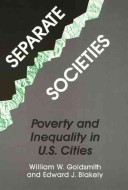Conflicts in Urban & Regional Development
1 total work
"Economic and political forces no longer combat poverty - they generate poverty!" exclaim William Goldsmith and Edward Blakely in their report on the plight of American's urban poor. Focusing on the reality of separation - social segmentation, economic inequality, and geographic isolation - the authors examine the presence and persistence of urban poverty, the transformation of national industry into a global economy, and the dilemmas of local reform. Goldsmith and Blakely document the appalling conditions of poor and minority people in central cities, examining those conditions in relation to inequalities in the national distributions of income and wealth. They analyze the connections between the structure and movement of the new global economy and the problems of the poorest Americans. They demonstrate how globalized markets and production arrangements have worsened the opportunities facing most American cities and workers. Noting that neither economic growth nor public subsidy has solved the problems of the poor, Goldsmith and Blakely propose that the very separation that exacerbates poverty be used to motive restructure.
The authors maintain that when those in power locally respond to the pressure exerted by those suffering from inequality and isolation, community-level institutions will be restructured. These multi-local coalitions of small businesses and neighborhood organizations need to press for reallocation of federal resources in favor of domestic needs and redirection of the national economic favor of workers and common citizens. Author note: William W. Goldsmith is Professor of City and Regional Planning and Director of the Program on International Studies in Planning at Cornell University. Edward J. Blakely is Professor of City and Regional Planning at the University of California, Berkeley.
The authors maintain that when those in power locally respond to the pressure exerted by those suffering from inequality and isolation, community-level institutions will be restructured. These multi-local coalitions of small businesses and neighborhood organizations need to press for reallocation of federal resources in favor of domestic needs and redirection of the national economic favor of workers and common citizens. Author note: William W. Goldsmith is Professor of City and Regional Planning and Director of the Program on International Studies in Planning at Cornell University. Edward J. Blakely is Professor of City and Regional Planning at the University of California, Berkeley.
